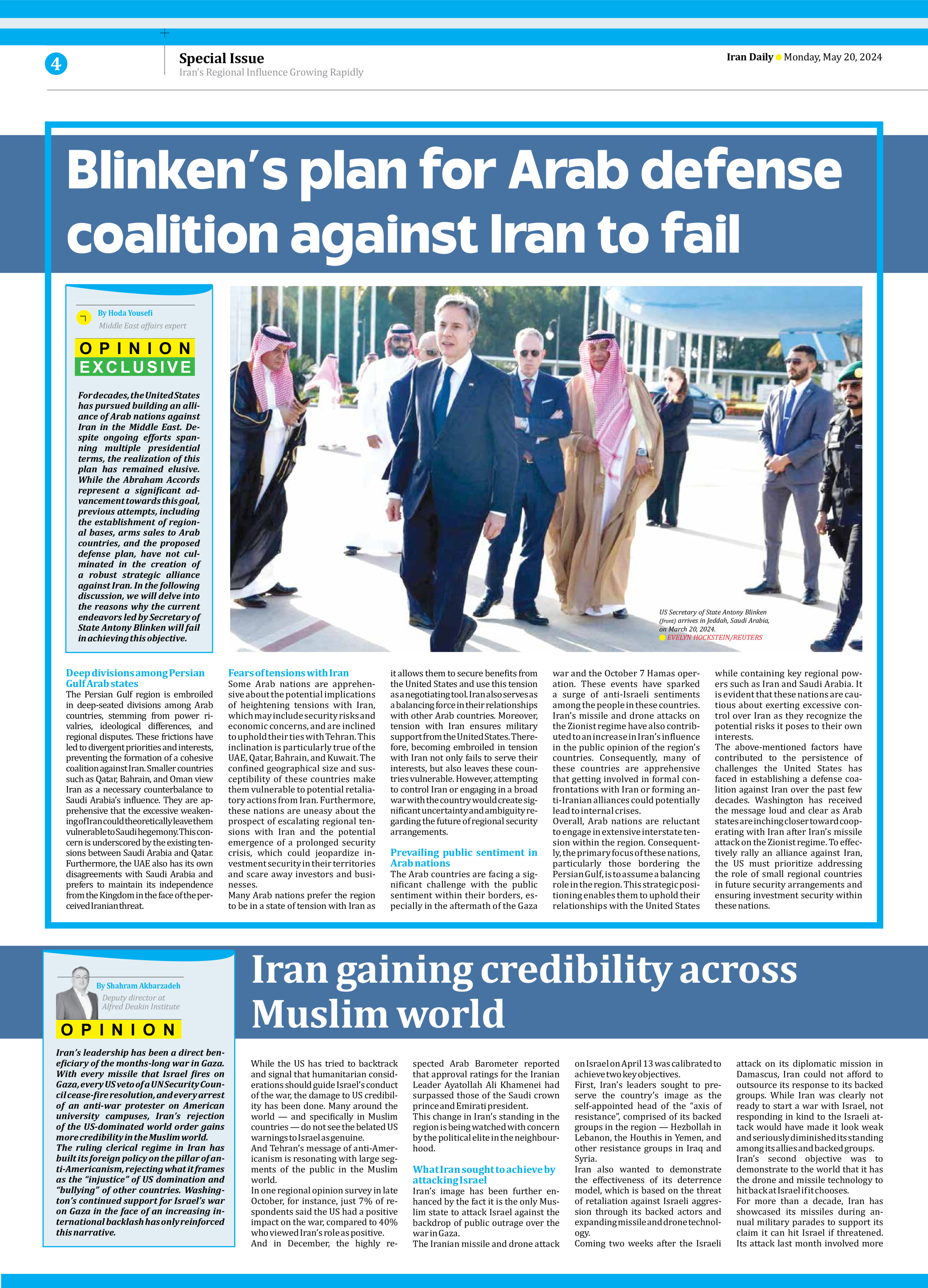
Blinken’s plan for Arab defense coalition against Iran to fail
For decades, the United States has pursued building an alliance of Arab nations against Iran in the Middle East. Despite ongoing efforts spanning multiple presidential terms, the realization of this plan has remained elusive. While the Abraham Accords represent a significant advancement towards this goal, previous attempts, including the establishment of regional bases, arms sales to Arab countries, and the proposed defense plan, have not culminated in the creation of a robust strategic alliance against Iran. In the following discussion, we will delve into the reasons why the current endeavors led by Secretary of State Antony Blinken will fail in achieving this objective.
By Hoda Yousefi
Middle East affairs expert
Deep divisions among Persian Gulf Arab states
The Persian Gulf region is embroiled in deep-seated divisions among Arab countries, stemming from power rivalries, ideological differences, and regional disputes. These frictions have led to divergent priorities and interests, preventing the formation of a cohesive coalition against Iran. Smaller countries such as Qatar, Bahrain, and Oman view Iran as a necessary counterbalance to Saudi Arabia’s influence. They are apprehensive that the excessive weakening of Iran could theoretically leave them vulnerable to Saudi hegemony. This concern is underscored by the existing tensions between Saudi Arabia and Qatar. Furthermore, the UAE also has its own disagreements with Saudi Arabia and prefers to maintain its independence from the Kingdom in the face of the perceived Iranian threat.
Fears of tensions with Iran
Some Arab nations are apprehensive about the potential implications of heightening tensions with Iran, which may include security risks and economic concerns, and are inclined to uphold their ties with Tehran. This inclination is particularly true of the UAE, Qatar, Bahrain, and Kuwait. The confined geographical size and susceptibility of these countries make them vulnerable to potential retaliatory actions from Iran. Furthermore, these nations are uneasy about the prospect of escalating regional tensions with Iran and the potential emergence of a prolonged security crisis, which could jeopardize investment security in their territories and scare away investors and businesses.
Many Arab nations prefer the region to be in a state of tension with Iran as it allows them to secure benefits from the United States and use this tension as a negotiating tool. Iran also serves as a balancing force in their relationships with other Arab countries. Moreover, tension with Iran ensures military support from the United States. Therefore, becoming embroiled in tension with Iran not only fails to serve their interests, but also leaves these countries vulnerable. However, attempting to control Iran or engaging in a broad war with the country would create significant uncertainty and ambiguity regarding the future of regional security arrangements.
Prevailing public sentiment in Arab nations
The Arab countries are facing a significant challenge with the public sentiment within their borders, especially in the aftermath of the Gaza war and the October 7 Hamas operation. These events have sparked a surge of anti-Israeli sentiments among the people in these countries. Iran’s missile and drone attacks on the Zionist regime have also contributed to an increase in Iran’s influence in the public opinion of the region’s countries. Consequently, many of these countries are apprehensive that getting involved in formal confrontations with Iran or forming anti-Iranian alliances could potentially lead to internal crises.
Overall, Arab nations are reluctant to engage in extensive interstate tension within the region. Consequently, the primary focus of these nations, particularly those bordering the Persian Gulf, is to assume a balancing role in the region. This strategic positioning enables them to uphold their relationships with the United States while containing key regional powers such as Iran and Saudi Arabia. It is evident that these nations are cautious about exerting excessive control over Iran as they recognize the potential risks it poses to their own interests.
The above-mentioned factors have contributed to the persistence of challenges the United States has faced in establishing a defense coalition against Iran over the past few decades. Washington has received the message loud and clear as Arab states are inching closer toward cooperating with Iran after Iran’s missile attack on the Zionist regime. To effectively rally an alliance against Iran, the US must prioritize addressing the role of small regional countries in future security arrangements and ensuring investment security within these nations.







